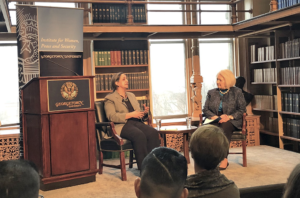The representation of Yemeni women in peace negotiations is necessary to put an end to the Yemeni conflict, Yemen’s former Minister for Human Rights Amat Alsoswa said at an event Friday.
Hosted by the Georgetown Institute for Women, Peace and Security, the event, titled “Prospects for Peace in Yemen,” was held in Riggs Library. The event was moderated by former U.S. Ambassador to Yemen Barbara Bodine and former U.S. Ambassador-at-Large for Global Women’s Issues Melanne Verveer.
Although women in the Middle East are often portrayed by Western media as voiceless and powerless, international acceptance of these generalizations as being the norm only further entrench inequality, according to Alsoswa.

“Yemeni women are unfortunately sometimes not seen the way they are. They are projected only within those stereotypical features about them, especially that most of the Yemeni women choose to wear — when they choose, of course — to wear this long black cover to cover their bodies with it,” Alsoswa said. “When they picture them like this, they think of them as very passive, very backward.”
In 2011, Yemeni community organizations moved against then-President Ali Abdullah Saleh’s rule during the Change Square protests. Yemeni women participated in these protests, which included advocacy for issues such as maternal mortality and ending child marriage in addition to anti-regime action, the New Yorker reported.
Stereotypical characterizations of Yemeni women are inaccurate and overshadow the efforts of women who participated in civil disobedience prior to 2015, according to Alsoswa.
“And they forget to see that Yemeni women, prior to the war for example, were participating, not only in the Change Square. I mean, their participation in the Change Square was just the latest wave of this massive woman movement,” Alsoswa said.
The Yemeni conflict escalated in 2015 when a group of Houthis, Zaydi Shia muslims from Northern Yemen, forced Yemen’s president, Abdu Rabbu Mansour Hadi, out of the capital city, to the city of Aden. Saudi Arabian involvement in the conflict began with Hadi’s exile and has since led to naval blockades that exacerbated humanitarian crises, such as a 2017 outbreak of cholera. The physical conflict as well as infrastructure problems and attacks by the Islamic State have led to the displacement of three million people and over 5,900 civilian deaths, according to Amnesty International.
Political dialogue in the country cannot move forward unless women are granted a seat at the negotiating table, a step forward that both the Yemeni government and Houthi rebels have refused to take, Alsoswa said.
“The parties, most of the time, resist. They say, ‘No, no, no. It is not really the time for women to be brought here,’” Alsoswa said. “The Yemeni women are not going to accept that. And definitely, there will be no peace agreement that is going to be fully implemented or implemented to start with if women are not accepted.”
Seventy-six percent of displaced Yemeni people are women and children, and approximately 21 percent of displaced households are run by women who are under the age of 18, according to a 2018 report by the United Nations Population Fund. Reports of gender-based violence in Yemen also increased by 36 percent in 2017.
As neither party in the conflict seems to have any invested interest in combating gender inequalities and human rights abuses towards women, it is paramount that women join the conversation, Alsoswa said.
“The fighters now are not unfortunately those who believe in equal rights or women’s rights, but rather sectarian lines where women are unfortunately not respected too much or politicized at best,” Alsoswa said. “But Yemeni women were teachers at universities. They were lawyers. They were judges. They were journalists.”
While Yemeni women must take individual initiative in agitating for greater representation and rights, the international community must take action not to perpetuate the conflict as well, according to Alsoswa.
Alsoswa argued that the inclusion of women in the conversation should give both Yemenis and the international community a reason for hope although conditions in Yemen may not seem conducive to long-lasting peace.
“The resistance you get from civil society organizations and young females in Yemen is really stronger than ever. Yes, they need a lot of help, but they are going to continue to work,” Alsoswa said. “They are truly going to be the ones who will really build peace.”




















